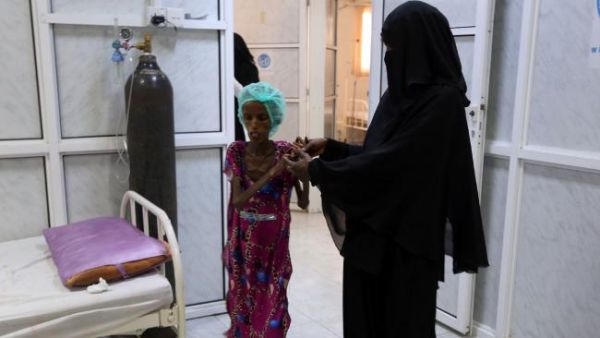"I feel immense pain when I see my children with their skeletons protruding because of their severe hunger," Umm Mohammed, a mother of six, said.
"I pray to God that I'll get just some crumbs of bread that feed their hunger."
Umm Mohammed, Arabic for mother of Mohammed, is a 40-year-old housewife from Yemen's western province of Hodeidah that has borne the brunt of the country's ongoing civil strife.
Some months ago, she moved to the Thawra Hospital in Hodeidah in a bid to save her two-year child, who suffers from malnutrition.
"Previously, three of my children suffered from the same disease, but they were treated. They are now somewhat better."
Umm Mohammed misses her life before the late 2014 eruption of a power struggle between Saudi-backed Yemeni President Abd Rabu Mansour Hadi and Iran-allied Houthi rebels.
"We used to have a comfortable life as my husband worked fishing and selling fish. But war has deprived us of everything," she said.
Her husband stopped fishing due to the airstrikes.
In March 2015 the Houthis advanced on the country's second largest city, Aden on the southern coast, triggering an air campaign by Saudi Arabia and its Sunni allies against the mostly Shia rebels.
"The airstrikes no longer differentiate between a soldier and a civilian," Umm Mohammed said. "When will this damned war end? It has only brought us destruction and famine."
Hodeidah, which has been under rebel control since 2014, is one of the poorest areas in this country of 26 million. The locals depended on the fishing and agriculture that have been upended by the ongoing fighting.
"The main reason for the spread of malnutrition and hunger in Hodeidah is unemployment, especially in coastal areas where inhabitants rely on fishing for living," said Dr Munaji Jebril, the head of Thawra Hospital's children's department.
Most rural areas in Yemen lacked efficient medical services in normal times, but since the war erupted, several medical facilities have been crippled due to either airstrikes and supply shortages.
Cases of malnutrition are too many for local centres to cope with, Jebril said, and malnutrition has taken a special toll on women and children.
"I tried to get pregnant three times but suffered miscarriages as a result of severe malnutrition," said Umm Ali, who lives in the north-western province of Hajjah.
"I really wish I could have a baby," the 35-year-old said.
In addition, she said, her husband has not received his salary from his work as a schoolteacher for the past four months.
The dire situation has forced the couple to live economically and work in agriculture in order to eke out a living.
Somaya al-Qodaimy, 14, looks pale and skinny. She is staying in the Sabaeen Hospital in the capital Sana'a.
"I am suffering from acute malnutrition. Doctors told me I have a severe lack of vitamins and minerals. They've also discovered I suffer from Hepatitis C," she said.
The teenager had moved to Sana'a for treatment from the north-western province of Omran province that has witnessed fierce battles between rebels and pro-government forces in recent months.
Her father was killed in the fighting a year ago. Her family has since been depending on farming and sheep herding to earn a living.
"My [health] condition has improved a little," she said. "The medical situation in Omran is so bad. There are neither medical centres nor healthcare workers there."
According to UN children's rights organization UNICEF, at least one child dies every 10 minutes in Yemen because of preventable diseases such as diarrhoea, malnutrition and respiratory tract infections.
The agency said in a December report that nearly 2.2 million children in Yemen are acutely malnourished and require urgent care, while at least 462,000 children suffer from severe acute malnutrition a drastic increase of almost 200 per cent since 2014.
An additional 1.7 million children suffer from moderate acute malnutrition.
Even before the escalation of the conflict in March 2015, poverty stricken Yemen faced challenges from widespread poverty, food insecurity and a dearth of health services, the reported said.
Now Yemen's health system is on the verge of collapse.
"Development decline, poverty, nutritional habits, lack of clean water and economic deterioration are among the main reasons for malnutrition in Yemen," UNICEF's Yemen spokesman Mohammed al-Asaadi told dpa.
"There are 19 [out of the country's 22] provinces suffering from an acute food shortage. Ten of the provinces are on the brink of famine."
By Amal Al-Yarisi








